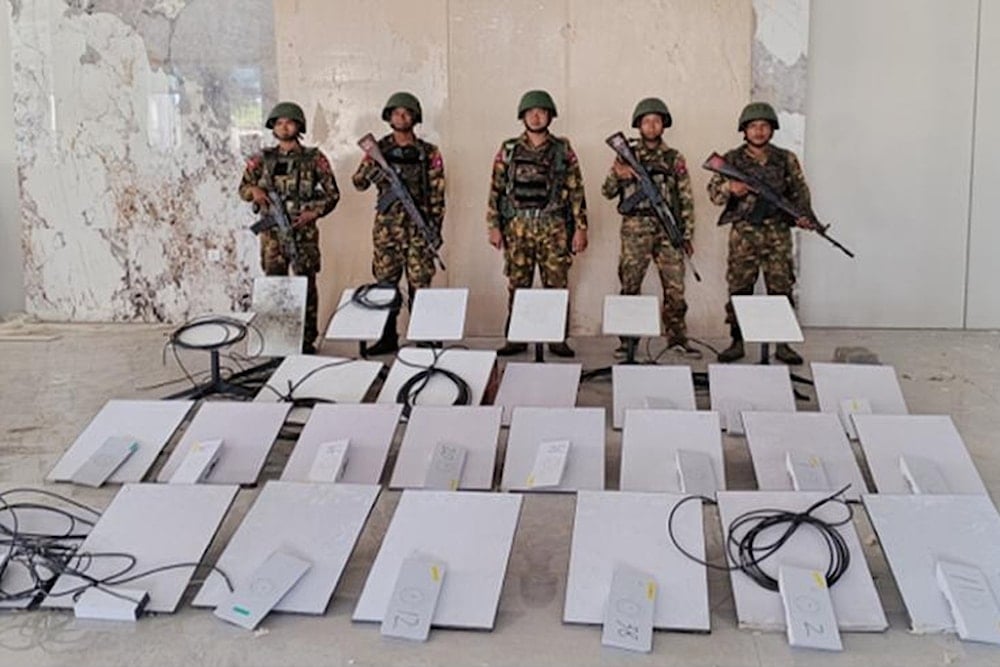Myanmar arrests 1,600 foreign workers in scam hub raids
Nearly 1,600 foreign nationals have been detained in Myanmar's crackdown on the Shwe Kokko cyber-fraud hub as authorities seize thousands of phones and computers.
-

In this image provided by the Myanmar military on Oct. 19, 2025, soldiers stand next to Starlink machines as they seize equipment from the KK Park online scam center in Myawaddy township, Karen State, Myanmar (AP)
Myanmar’s military authorities say they have arrested almost 1,600 foreign nationals in a sweeping crackdown on a major online fraud hub near the Thai border, amid mounting pressure from China to curb the booming scam industry.
According to state media outlet The Global New Light of Myanmar, a total of 1,590 foreigners who “entered Myanmar illegally” were detained between November 18 and 22 during raids on the Shwe Kokko special economic zone.
The raids reportedly led to the seizure of nearly 2,900 computers, over 21,700 mobile phones, more than 100 Starlink satellite receivers, and other communications equipment allegedly used in fraud operations.
The crackdown comes as internet scam compounds have spread throughout Myanmar’s borderlands, taking advantage of weakened state governance since the 2021 coup that triggered a nationwide civil war. These operations are known to target victims globally with romance scams, cryptocurrency swindles, and business fraud schemes worth tens of billions of dollars each year.
Thousands of devices at cybercrime compounds
Last month, an AFP investigation revealed large-scale installations of Starlink receivers at scam sites in Myanmar. The company said it has since disabled more than 2,500 devices near suspected cybercrime compounds.
Authorities said 223 alleged fraud operators were arrested on Saturday alone, including 100 Chinese nationals, as the junta sought to highlight its cooperation with Beijing. Local media footage showed a steamroller crushing hundreds of computer monitors at Shwe Kokko, a display some observers viewed as a public relations move.
Analysts and rights groups warn the junta’s campaign is likely aimed at easing diplomatic pressure rather than dismantling a lucrative criminal enterprise that enriches powerful allied militias. China, a key military backer of the junta, has increasingly voiced frustration with the scams, which frequently recruit or traffic Chinese citizens.
A recent United Nations report estimated that victims across Southeast and East Asia lost up to $37 billion in 2023 to cyber-fraud networks operating largely out of Myanmar and Cambodia, noting that the true global cost is likely “much larger”.
Congress probes Musk’s Starlink
A bipartisan committee in the US Congress has opened an investigation into Elon Musk’s Starlink satellite internet service, following reports that the company’s technology has been used to provide connectivity to the scam compounds. These centers, blamed for defrauding victims across the globe of billions of dollars, have drawn growing international scrutiny.
The probe was prompted by reports revealing that Starlink terminals began appearing on the rooftops of scam compounds in Myanmar earlier this year, just as authorities were claiming to crack down on such criminal operations.
The findings, first reported by Agence France-Presse (AFP), suggest Starlink’s technology may have enabled the scam networks to quickly re-establish communication after the raids.
Data from the Asia Pacific Network Information Center (APNIC) indicates that Starlink has rapidly become Myanmar’s largest internet provider in a span of just three months, despite the country’s ongoing internal conflict and limited official approval for foreign internet services.

 3 Min Read
3 Min Read








